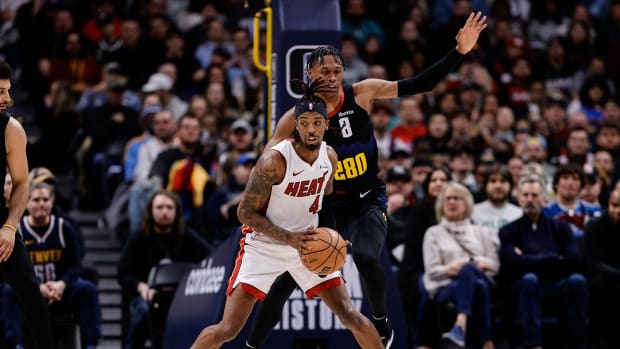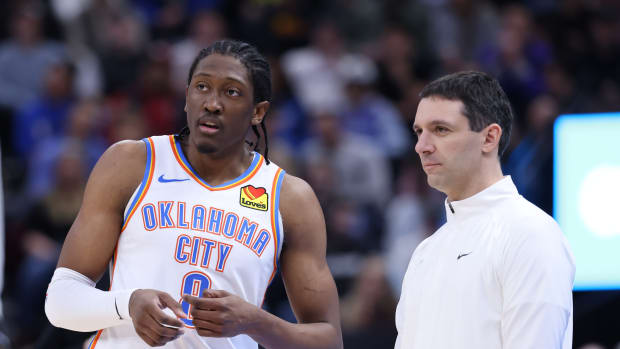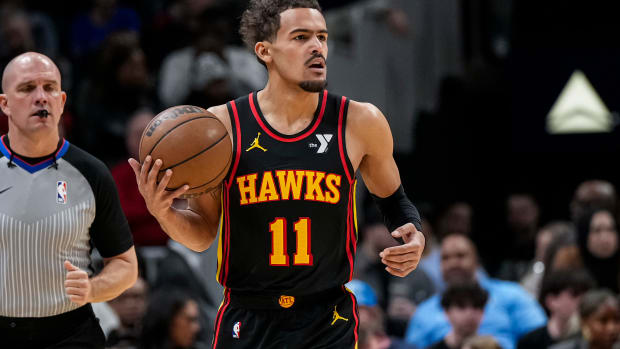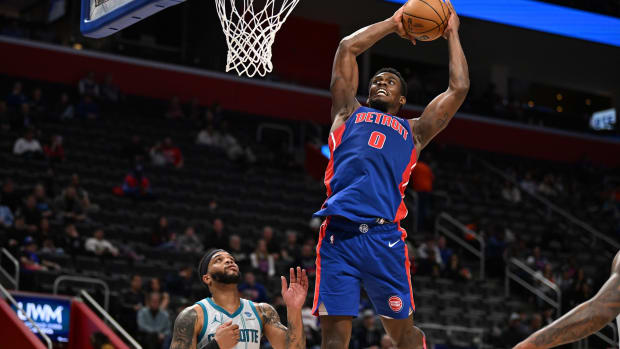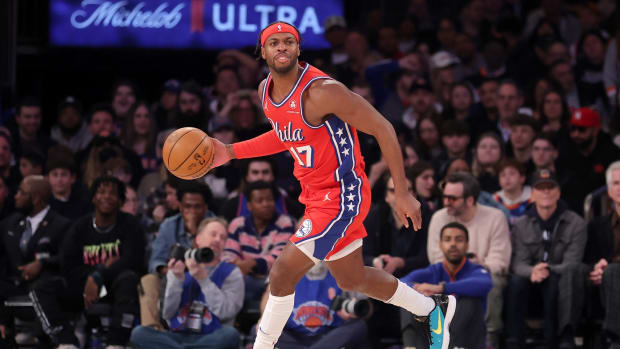C.J. McCollum Q&A: The NBA's Most Media-Savvy Star
It's a pity that Portlandia is ending its run after eight seasons. Otherwise, the IFC Network’s send-up of life in absurdist Portland could have based a character on C.J. McCollum. Apart from the requisite hipster facial hair, the Portland shooting guard is a study in unconventional. A product of the vaunted NBA factory that is…Lehigh, McCollum is the rare athlete whose locker doubles as a library, who spent a week before the season at a business symposium at Harvard, who doesn’t merely interact cheerfully with the media, but has ambitions of one day joining the profession. Such as it is.
Meanwhile, though, McCollum has established himself as a damn good NBA player. Now in his fifth year, McCollum (23.5 PPG, 4.4 RPG, 2.5 APG, 52.4 3P%) has improved statistically each season and joins Damian Lillard to comprise the NBA’s quintessential backcourt.
McCollum recently chatted with The Crossover and lived up to his billing as an engaging conversationalist.
Jon Wertheim: I have a conspiracy theory about you.
C.J. McCollum: What’s that?
JW: When you say you’re interested in a future in media, we’re flattered and now you’ve basically guaranteed that we will write and speak very nice things about you.
CJM: No! Writing and speaking and communicating, it’s something important to me, and something I want to get better at. Over the last five years—and in college—I think I’ve done a pretty good job building my résumé and taking advantage of different opportunities. But my media career, it’s on hold right now, because of the season.
JW: You can do a long-form interview or written piece with one athlete. Who do you choose?
CJM: Kobe. Or Michael. And I’d probably say Serena just because of her story and how she got to be in the position she’s in today. Regardless of gender, she’s arguably one of the greatest athletes ever.
JW: What are you reading these days?
CJM:Blink. I like Malcolm Gladwell. Outliers, Tipping Point, the whole library.
JW: How many guys in the NBA can beat your brother, Errick, one-on-one?
CJM: Not a lot. There are some very good players in the NBA, but not a lot.
JW: Can you?
CJM: Let’s just say I’m pretty good one-on-one. We usually play four out of seven games. We play to 1. Win by two. Three-pointers count as two. Three dribbles.
JW: Seriously though, I imagine seeing your brother must help you frame your own career—
CJM: That could easily have been me. Similar stories, except he went to a Division II school and I went to a Division I school. I was a later bloomer. They said I didn't have a position. Can I create a shot against elite defenders? Same stuff. He struggled at first and then found his way in Europe. Now he’s one of the best players in Europe and, miraculously, he’s making a lot more money than some NBA guys.
JW: Thin margins in this business.
CJM: So thin. That’s my career path if I don't make it to the NCAA tournament [at Lehigh] and if I don't play well against that Duke team. What if I play poorly and we lose? It could just have been a bad day but they would say, ‘He’s not ready. He can’t play in big games.’ When you come from a small school, you get judged on these narrow situations. Coming from a Division II school [Errick played at Goshen College in Indiana] it’s even tougher.
JW: What’s a guy who works in Oregon doing leaving Nike and signing with Li Ning?
CJM: I’m thankful for the partnership and the opportunity. I feel like they can help their brand and I feel like I can help develop my brand.
JW: I feel like that was a media-trained answer.
The Clippers Are All-In On Blake Griffin
CJM: Look at how many people there are in China and with that type of media presence they have and I can have, I’m looking forward to the challenge.
JW:: Best takeaway lesson you learned from your time at Harvard?
CJM: Man, we learned a lot. I listened to so many entrepreneurs talk about marketing, figuring out balancing time, not being afraid to take chances. Maybe that would be the biggest lesson: in your career and in life don’t be afraid to gamble. People from Google in Asia to the Discovery Channel to YouTube to Gerard Pique to L.L. Cool J. Something else we learned: internationally how they approach decisions and partnerships. There’s a lot more out there besides the North American perspective.
JW: What’s one thing Damian Lillard does better than you?
CJM: Finish at the rim, finding different angles, getting to the free–throw line. I need to do a better job—
JW: You’re giving away too much. I didn't mean basketball.
CJM: In that case, I’d say he’s a better rapper.
JW: You’re okay with that.
CJM: I accept who I am. Rapping is not my forte.
JW: 'Keep Portland Weird' is the unofficial civic motto here. What’s the weirdest thing you’ve encountered in Portland?
CJM: I don’t know about ‘weird’ but I love the local food scene here. Anything from all over the world.
JW: I’m sensing a theme to this conversation: globalization.
CJM: Maybe it’s me. But growing up in the Midwest, in Canton, Ohio, you don't appreciate how big the United States is. And at the same time, then you travel around and you don’t realize how small the United States is. Europe. Asia. China. Africa. There’s a whole world out there. And it’s huge.































